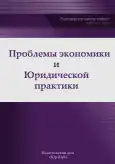Проблемы защиты результатов интеллектуальной деятельности военных организаций в Российской Федерации
- Авторы: Королькова Д.А.1
-
Учреждения:
- Военный университет имени князя Александра Невского Министерства обороны Российской Федерации
- Выпуск: Том 18, № 6 (2022)
- Страницы: 102-107
- Раздел: Статьи
- URL: https://journal-vniispk.ru/2541-8025/article/view/147297
- ID: 147297
Цитировать
Аннотация
Цель исследования заключается в рассмотрении некоторых проблем в сфере защиты результатов интеллектуальной деятельности военных организаций, дать им правовую оценку и указать возможный вектор решения каждой из них. Выводы. Большое количество произведений создается на рабочем месте, при этом правильное оформление прав происходит далеко не всегда. Отсутствие единых требований может негативно повлиять на общий уровень качества служебных произведений в структуре Вооруженных Силах Российской Федерации. Выходом из сложившейся ситуации может служить либо отказ от повышенных требований по оригинальности к служебным произведениям, либо введение во всех военных организациях единого регламента по созданию служебных произведений. На сегодняшний день, актуальной проблемой, связанной с защитой результатов интеллектуальной деятельности военных организаций является проблема, заключающаяся в том, что государство обеспечивает возможность для организаций государственного сектора, в т.ч. военных организаций бесплатно производить государственную регистрацию результатов интеллектуальной деятельности только на территории Российской Федерации. Отсутствие возможности международной регистрации результатов интеллектуальной деятельности военных организаций повышает риск отслеживания и копирования российских технологий, сведения о которых публикуются в открытых базах Роспатента агентами иностранных государств.
Об авторах
Дарья Александровна Королькова
Военный университет имени князя Александра Невского Министерства обороны Российской Федерации
Email: daria.kirilchenko@mail.ru
кандидат юридических наук, доцент кафедры гражданского права Москва, Российская Федерация
Список литературы
- Евстафьева И. В. Проблемы квалификации произведений в качестве служебных // Евразийский юридический журнал. 2019. № 3(130). С. 156-157.
- Киселев А.С. О некоторых вопросах практики применения гражданского законодательства // Журнал прикладных исследований. 2020. № 2. С. 58-65.
- Левушкин А. Н. Защита прав на результаты интеллектуальной деятельности военного и двойного назначения при исполнении лицензионного договора // Журнал прикладных исследований. 2020. № 4-2. С. 47-53.
- Мишуткин И. В. Проблема защиты прав Российской Федерации на результаты интеллектуальной деятельности военного и двойного назначения // Журнал прикладных исследований. 2020. № 4-2. С. 35-37.
- Новикова Н.А. Проблемы отраслевой принадлежности отношений в связи со служебными произведениями // Вопросы российской юстиции. 2019. № 1. С. 308-321.
- Проньо С.Д., Карцхия А.А. Проблемы защиты прав авторов служебных произведений // Новые возможности юридической специализации: перспективные научно-практические разработки и исследования: Сборник статей участников круглого стола, Москва, 03 декабря 2020 года. -М.: ООО «ЭкООнис-экологически чистые технологии», 2021. -С. 55-59.
- Санташов А.Л., Киселев А.С. О некоторых направлениях совершенствования законодательства, регулирующего осуществление Российской Федерацией прав на результаты интеллектуальной деятельности военного и двойного назначения // Военное право. 2020. № 3(61). С. 73-83.
- Соломоненко Л. А. Перспективы развития института служебных произведений // Право и экономика. 2018. № 10(368). С. 69-72.
- Леонова О.В. Гражданско-правовая защита прав авторов на служебные произведения // Теория и практика современной юридической науки : Материалы VII всероссийской научно-практической конференции, Санкт-Петербург, 16 апреля 2020 года / Отв. редактор Е.Б. Гоголевская. Науч. редактор И.С. Кокорин. -СПб.: Ленинградский государственный университет имени А.С. Пушкина, 2020. -С. 203-210.
- Харитонова Ю. С. Правовые проблемы применения технологии искусственного интеллекта при принятии решений в военном деле // Журнал прикладных исследований. 2020. № 4-2. С. 54-57.
Дополнительные файлы








